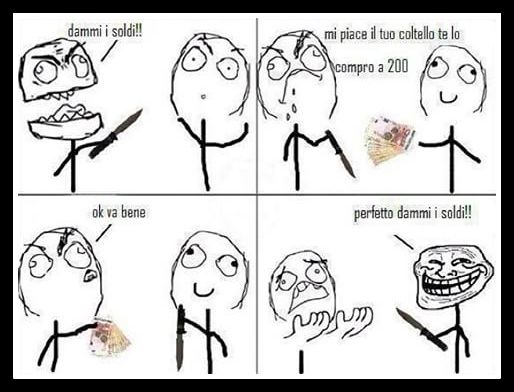Dammi I Soldi! Posted by Geoff on Feb 15, 2017 in Uncategorized
People often ask me where I get my ideas for blogs, and it’s a difficult question to answer. Take today’s post, for example …
Yesterday morning I walked out onto la terrazza in front of our house and happened to glance at the narrow strip of garden to the right. There, to my surprise, I spotted a small round hole drilled neatly down into the soil. It looked distinctly like it had been burrowed by a rat, and my first thought was: “Se quel buco l’ha fatto un ratto, lui avrà le palle di acciaio!” (If a rat has made that hole he’s got balls of steel) because with our six cats around … well, put it like this, if I was a rodent it wouldn’t be my ideal spot to make my home.
Then another thought occurred to me. I went back indoors and said to Serena: “There’s a strange hole in the garden, and I think it’s been made by a rat”. “Yes”, said Serena, “I saw it yesterday and forgot to tell you”.
“Secondo me”, I said, “quel ratto sta pagando la mancia ai gatti” (In my opinion that rat’s paying a tip to the cats). And then I hesitated: “Wait, is it mancia or manciata? No hang on, it’s mazzette! Damn, what’s that word for the protection money paid to La Mafia?”
Serena: “Well, mancia is tip, like in the restaurant, but you can use mazzette (bundles) or bustarelle (little envelopes), which refer to the bundles of money or envelopes full of cash paid as bribes to people in public office for example. The best word though is ‘il pizzo’, which is the Mafia word for protection money.”
Geoff: “Yes, that’s the word I wanted! In that case what I meant to say was: ‘quel ratto sta pagando il pizzo ai gatti‘ (that rat’s paying protection money to the cats).”
At that point I felt a familiar part of my brain awaken, a few cogs creaked, and then … bingo, out popped a blog!
(N.B. yes, Serena and I often speak in a mixture of English and Italian!)
Basic Money Vocabulary
i soldi (masculine plural) = money
il denaro (masculine singular) = money (older form)
la moneta = the coin/currency
gli spiccioli = small change
il resto = the change
il costo = the cost
il cambio = the currency exchange
il conto = the account
una banconota = a banknote
un/due/tre … euro = one/two/three … euro (N.B. euro does not pluralise)
un centesimo/due/tre … centesimi = one cent/two/three …. cents
la banca = the bank
il bancomat = the cash machine
Verbs
pagare in contanti = to pay with cash
pagare con assegno = to pay by cheque
pagare con la carta = to pay with a credit card
costare/venire = to cost, e.g. quanto costa questa giacca? (how much is this jacket?), quanto vengono le arance? (how much are the oranges?)
guadagnare = to earn, e.g.: Giorgio guadagna un mucchio di soldi (Giorgio earns a lot of money)
ritirare = to withdraw, e.g.: devo ritirare dei soldi dalla banca (I have to withdraw some money from the bank)
versare = to deposit, e.g. ho versato 50 euro sul tuo conto (I’ve deposited 50 Euro into your account)
dovere = to owe money, e.g.: quanto ti devo? (how much do I owe you?)
essere in credito = to be in credit
essere in debito = to be in debt
A Few Idiomatic Expressions
è pieno di soldi = he’s got loads of money (lit: he’s full of money)
abbiamo pagato una barca di soldi = we paid a lot of money (lit: we paid a ship full of money)
ci è costato un occhio della testa = it cost us an arm and a leg (lit: it cost us an eye from the head)
non vale un soldo = it’s worthless (lit: it’s not worth a coin)

Build vocabulary, practice pronunciation, and more with Transparent Language Online. Available anytime, anywhere, on any device.





Comments:
Trish Herbert:
Un altro detto “avere le mani bucate” – to spend money like water….
Rose Rossi:
Thank you Mille Grazie I so enjoy reading your post. Continued success! I love being able to keep up reading in Italian. Auguri!!
Serena:
@Rose Rossi Grazie anche a te Rose! Saluti da Geoff 🙂
Rita Kostopoulos:
Molto importante e utile
Grazie mille.
Rita
Joseph T. Madawela:
GRAZIE. Il blog era molto piacevole e istruttiva.
Eduardo:
Grazie. Non mi ricordavo del nome del “pizzo”.
Laurel Barton:
Mi piace molto quest’ argomento, e questo blog è molto divertente! Il pizzo, infatti!
Norma Tingram:
Regarding “le palle di acciaio”, what is the difference between palle and coglioni? Is one for animals and one for people?
Geoff:
@Norma Tingram They’re interchangeable Norma. E.g. Non mi rompere le palle/non mi rompere i coglioni, mi hai rotto le palle/mi hai rotti i coglioni.
Ecco la poesia della Bella Lingua! 😉
Judy Green:
I just wanted to say thank you for writing your fabulous blogs. Varied, always helpful, short so always easy to read however busy you are. Some cultural gems, grammatical gems and idiomatic gems. I love them! Thank you!!